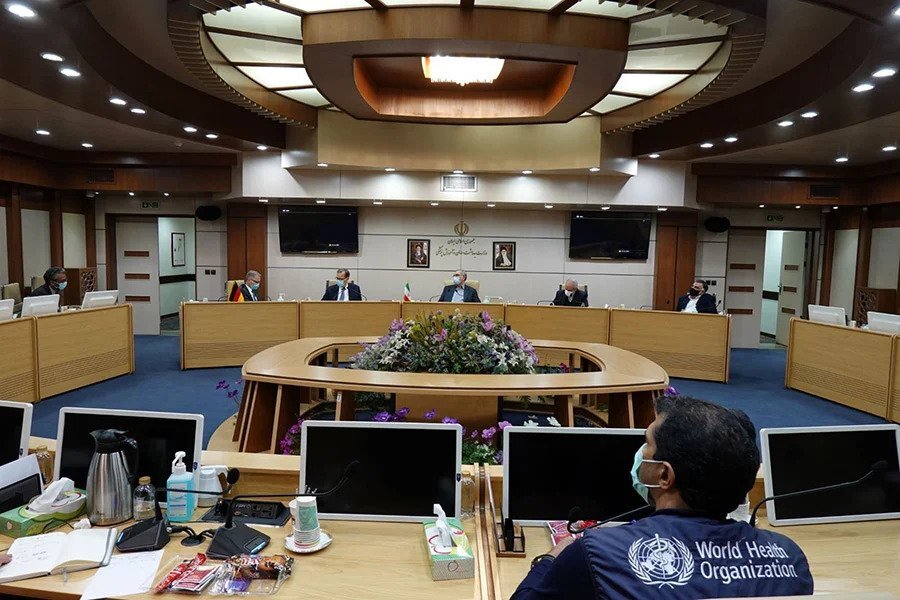Robert Koch Institute shares experience with Iran on COVID-19

TEHRAN - A team of experts from the Robert Koch Institute (RKI) of Germany has recently met with the Iranian health authorities and professionals in order to share their experience in response to COVID-19 through reviewing achievements, identifying challenges, laying down recommendations, and assessing potential areas of cooperation.
The six-day mission, facilitated by the World Health Organization (WHO), began on November 22.
Headed by Dr. Andreas Jansen, Director of the Information Center for International Health Protection at RKI, the mission aimed to assess Iran’s COVID-19 response performance in the three pillars of in-country surveillance, case investigation and contact tracing, and case management and infection prevention and control, and to provide recommendations on how to improve them for the current and future emergencies.
At the first meeting of the mission with Health Minister Dr. Bahram Eynollahi, the German ambassador to Tehran, Mr. Hans-Udo Mutzel, Director-General of the Ministry of Health and Medical Education’s International Relations Department (IRD), Dr. Mohammad Hossein Niknam, officials from Iranian Center for Infectious Diseases Control (CDC), and WHO professionals, WHO Representative Dr. Syed Jaffar Hussain provided a briefing on the country's current situation in terms of the COVID-19 response, strengths of the treatment and research system, and gaps in the health and laboratory infrastructures, especially in genome sequencing.
“Iran has relied on local capabilities and domestic solutions to manage the COVID-19 crisis due to the isolation brought on by unilateral sanctions,” he said and stressed the need to improve strategic and practical ways to complement local expertise and the need for specialized training.
“It is important to foster cooperation between managers at the national level and academia, exchange knowledge and experiences, and communicate with international counterparts,” he underlined.
Dr. Eynollahi referred to a number of concerns regarding the COVID-19 response in the country despite the good national performance over the recent months. “The recent flare-up of COVID-19 in other countries has concerned us about the future of the epidemic,” he expressed.
“Up until a few months back in Iran, 50,000 new COVID-19 patients were identified daily in the country, where a daily toll of 700 deaths was reported in one day, but by stepping up vaccination efforts and public participation, the situation in Iran has improved today.”
The Minister also took stock of the good health and medical facilities in Iran, including about 1000 hospitals, 20,000 medical faculty members, and 150,000 hospital beds in the country, and the ongoing development of five local vaccines against COVID-19.
Dr. Jansen last visited the Islamic Republic of Iran in the spring of 2020 along with WHO representatives, when they witnessed the great efforts of health care staff to control COVID-19.
Dr. Niknam and Dr. Gouya pointed to the commonalities between the two countries in the high number of COVID-19 cases and expressed enthusiasm for possible areas of bilateral collaboration. “The role of WHO country office in Iran in facilitating this mission and other mutual collaborations cannot be denied,” added Dr. Gouya, Director of CDC.
“Considering the similar situation that Germany is facing, bilateral cooperation and sharing experiences can be instrumental to deal with this pandemic, and a comprehensive collaboration is very much needed,” agreed Dr. Jensen, noting that the main focus of his team is to study areas of infection control within the national health care system, particularly antibiotic resistance, where long-term joint projects can be developed and implemented.
Over several meetings between RKI and the Ministry of Health and Medical Education and affiliated centers, the visiting experts were briefed on measures taken in infection prevention and control in the country. Among the challenges discussed were access to quality supplies (e.g. antibiotics, different mediums, reagents, and consumables), participation in quality assessment programs, updating of analytical systems including software, provision of training for new technologies in the field, and providing support to the antimicrobial resistance surveillance program. The team also visited various hospitals, primary health care centers, and health research organizations in the provinces of Tehran and Isfahan.
The German experts’ team concluded their visit by putting forth a number of recommendations based on identified challenges and gaps during the mission, including on how to improve surveillance in the country. They also expressed the Institute’s readiness to support and collaborate with Iranian health authorities on contract tracing, and to carry out joint projects in cooperation with WHO and the Ministry of Health and Medical Education.
MG
Photo: RKI team sit at a meeting with Health Minister Dr. Bahram Eynollahi, German ambassador to Tehran Mr. Hans-Udo Mutzel, and WHO Representative Dr. Syed Jaffar Hussain. (Photo: WHO/ Islamic Republic of Iran.)
Leave a Comment